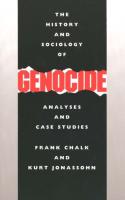Description
By including political and social groups as potential victims, Chalk and Jonassohn provide a definition of genocide that is considerably broader than that contained in the United Nations Convention on Genocide. They present a typology of genocide according to the motives of the perpetrator: to eliminate a perceived threat; to spread terror among real or potential enemies; to acquire economic wealth; or to implement a belief, theory, or ideology. Chalk and Jonassohn show how the first three motives have played a role in the establishment and maintenance of empires. They note that since empires have almost disappeared, so have these three types of genocides become rare, and that ideological genocides have become the most important type of genocide in the twentieth-century. The second part of the book consists of selected studies. These include Rome's final war with Carthage, the Mongol Conquests, the Albigensian Crusades, the Great Witch-Hunt, Christians in Japan, Indians in the Americas, Ndwandwe under Shaka Zulu, Hereros in German South West Africa, Armenians in Turkey, the Soviet Union under Stalin, the Holocaust, Indonesia, Bangladesh, Burundi, and Cambodia, among others. The last part of the book presents topical bibliographies to aid the student and researcher.
Product Details
- Yale University Press Brand
- Sep 10, 1990 Pub Date:
- 9780300044461 ISBN-13:
- 0300044461 ISBN-10:
- 480 Pages
- English Language
- 9.2 in * 6.09 in * 1.27 in Dimensions:
- 1 lb Weight:




